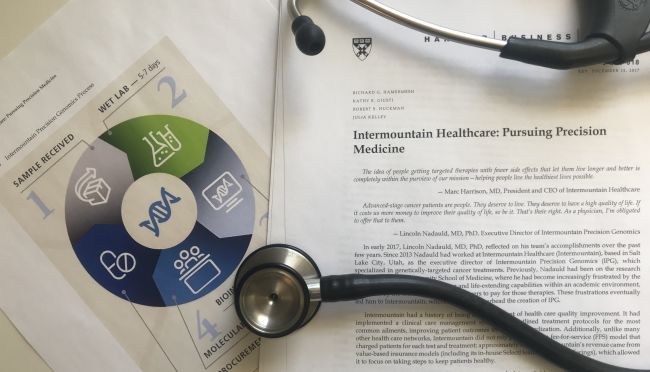Knowledge →
→
.jpg)
- 31 Oct 2023
- HBS Case
Checking Your Ethics: Would You Speak Up in These 3 Sticky Situations?
Would you complain about a client who verbally abuses their staff? Would you admit to cutting corners on your work? The answers aren't always clear, says David Fubini, who tackles tricky scenarios in a series of case studies and offers his advice from the field.

- 24 Oct 2023
- Research & Ideas
When Tech Platforms Identify Black-Owned Businesses, White Customers Buy
Demand for Black-owned restaurants rises when they're easier to find on Yelp. Research by Michael Luca shows how companies can mobilize their own technology to advance racial equity.

- 23 Jun 2023
- HBS Case
This Company Lets Employees Take Charge—Even with Life and Death Decisions
Dutch home health care organization Buurtzorg avoids middle management positions and instead empowers its nurses to care for patients as they see fit. Tatiana Sandino and Ethan Bernstein explore how removing organizational layers and allowing employees to make decisions can boost performance.

- 24 Aug 2020
- Working Paper Summaries
When Do Experts Listen to Other Experts? The Role of Negative Information in Expert Evaluations for Novel Projects
Evaluators of early-stage scientific proposals tend to systematically focus on the weaknesses of proposed work rather than its strengths, according to evidence from two field experiments.

- 14 Jan 2020
- Research & Ideas
The Business Case for Becoming a Jack-of-All-Trades
New research by Frank Nagle and Florenta Teodoridis shows that a jack-of-all-trades may be better equipped than a specialist to jump on novel knowledge. Open for comment; 0 Comments.

- 14 Jan 2020
- Working Paper Summaries
Engineering Serendipity: The Role of Cognitive Similarity in Knowledge Sharing and Knowledge Production
By creating opportunities for cross-disciplinary scientists to meet and talk as part of a natural field experiment, this study analyzes and finds evidence for a systematic relationship between knowledge sharing and knowledge production in the sciences. Findings may extend to similar types of cross-disciplinary knowledge-sharing opportunities in other settings.

- 06 Jan 2020
- Research & Ideas
Motivate Your High Performers to Share Their Knowledge
Companies are sitting on a largely untapped resource to improve employee performance, says Christopher Stanton—the knowledge of their co-workers. Open for comment; 0 Comments.

- 21 Jul 2019
- Working Paper Summaries
Why Do User Communities Matter for Strategy?
Communities of users are shaping the industrial landscape and contributing to the innovations we use every day. The effects of user communities on firms, industries, and society will continue to grow. This article discusses the relationship between user communities and firms to shed light on avenues for future research in business strategy.

- 19 Jun 2019
- Working Paper Summaries
Migrant Inventors and the Technological Advantage of Nations
This study provides robust econometric evidence for how immigrant inventors shape the innovation dynamics of their receiving countries. Countries receiving inventors from other nations that specialize in patenting particular technologies are more likely to have a significant increase in patent applications of the same technology.

- 02 Apr 2019
- Working Paper Summaries
Managerial Quality and Productivity Dynamics
Which managerial skills, traits, and practices matter most for productivity? This study of a large garment firm in India analyzes the integration of features of managerial quality into a production process characterized by learning by doing.

- 26 Mar 2019
- Working Paper Summaries
Managed Ecosystems and Translucent Institutional Logics: Engaging Communities
Organizations increasingly rely on engagement with external communities of contributors. This paper explores transitions to a managed-ecosystem governance mode and its implications for strategy and innovation. To be successful, firms must develop the capabilities to shepherd communities, leverage without exploiting them, and share intellectual property rights.

- 28 Feb 2019
- Cold Call Podcast
Pursuing Precision Medicine at Intermountain Healthcare
What happens when Intermountain Healthcare invests resources in an innovative precision medicine unit to provide life-extending, genetically targeted therapies to late-stage cancer patients? Professors Richard Hamermesh and Kathy Giusti discuss the case and its connections to their work with the Kraft Precision Medicine Accelerator. Open for comment; 0 Comments.

- 07 Jan 2019
- Research & Ideas
The Better Way to Forecast the Future
We can forecast hurricane paths with great certainty, yet many businesses can't predict a supply chain snafu just around the corner. Yael Grushka-Cockayne says crowdsourcing can help. Open for comment; 0 Comments.

- 27 Dec 2018
- Working Paper Summaries
Team Learning Capabilities: A Meso Model of Sustained Innovation and Superior Firm Performance
In strategic management research, the dynamic capabilities framework enables a “helicopter view” of how firms achieve sustainable competitive advantage. This paper focuses on the critical role of work teams, arguing that managers must leverage the knowledge generated by teams to support innovation and strategic change. It matches types of team learning to innovation activities.

- 19 Dec 2018
- Working Paper Summaries
Find and Replace: R&D Investment Following the Erosion of Existing Products
This study sheds light on how product outcomes shape the direction of innovation and markets for technology. In the drug development industry in particular, negative product shocks appear to spur investment changes both within the directly affected firm and in competing firms in the same R&D markets.

- 07 Dec 2018
- Working Paper Summaries
Oral History and Writing the Business History of Emerging Markets
Oral history is a valuable resource to explore how businesses developed and functioned in Africa, Asia, and Latin America, regions with a growing share of global economic activity and the majority of the world’s population. While oral history is not uncritical, it provides openings for opinions, voices, and judgements on events on which there was often silence.

- 05 Dec 2018
- Working Paper Summaries
The Salary Taboo: Privacy Norms and the Diffusion of Information
Barriers to the diffusion of salary information have implications for a wide range of labor market phenomena. This study of employees of a real organization shows that individuals significantly misinterpret their peers’ salaries, partly due to pervasive preferences for concealing own salary, and a potentially strategic decision of high earners to withhold their personal information.

- 08 Nov 2018
- Working Paper Summaries
Arbitration with Uninformed Consumers
Using data on securities disputes, this study of information advantages in consumer arbitration finds that industry-friendly arbitrators are 40 percent more likely than consumer-friendly arbitrators to be selected to take on arbitration cases. Limiting respondents’ and claimants’ inputs over the selection process could improve outcomes for consumers.

- 26 Sep 2018
- Working Paper Summaries
Shifting Centers of Gravity: Host Country versus Headquarters Influences on MNC Subsidiary Knowledge Inheritance
This study compares how multinational corporation subsidiaries inherit knowledge from both the headquarters and the local context. To do so the authors analyzed seven years of data (2005–2011) of US patents filed by all subsidiaries of the top 25 US headquartered multinationals.

The Network Effect: Why Companies Should Care About Employees’ LinkedIn Connections
What do Honeywell, IBM, and Pfizer have in common? Employees with strong professional networks. A study of 2 billion employee relationships on LinkedIn probes the power of such connections—and potential benefits for companies. Research by Frank Nagle.